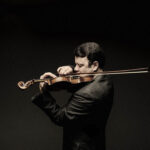| 05. 10. 2023 19:00 p.m. |
| Kino Vesmír |
| from 400 CZK |
A1 Opening concert of the 70th season
Beethoven’s Violin Concerto and Shostakovich’s Ninth Symphony, violinist Vadim Gluzman and JPO chief conductor Vassily Sinaisky, who share not only a long-term professional but also a friendly bond. In addition, Gluzman will complement Beethoven’s concerto with modern cadences from the pen of Alfred Schnittke.
Ludwig van Beethoven
Concerto for Violin and Orchestra in D major, Op. 61
Dmitri Shostakovich
Symphony No. 9, Op. 70
Vadim Gluzman – violin
Janáček Philharmonic Ostrava
Vassily Sinaisky – Chief Conductor of the JPO
Violinist Vadim Gluzman shares not only a professional but also a long-standing friendship with JPO Chief Conductor Vassily Sinaisky. The two performers will now join forces for a performance of Ludwig van Beethoven’s Violin Concerto. Although the piece from the very beginning of the 19th century still springs from a classical background, it already brings a slight whiff of romanticism with its proportions and the position of the orchestra almost on a par with the soloist. Moreover, Vadim Gluzman complements Beethoven’s concerto with unconventional, modern cadenzas from the pen of Alfred Schnittke.
It was Beethoven who turned the ninth into an almost magical number. At least for music symphonists. Any composer who set out to write his ninth symphony encountered the often exaggerated expectations of the public. For Dmitri Shostakovich, the Ninth Symphony represented a particularly heavy burden. When he began composing the work in 1945, the Soviet regime of the time also had high expectations. After Shostakovich’s two war symphonies, he expected a majestic, vocal-orchestral work glorifying Stalin and the victory of the Red Army. A work that would become the Soviet national “ode”. But what he got was a neo-classical and Mozartian joyous symphony. Infuriated regime officials soon banned the work on Stalin’s orders and it did not return to the concert stage until many years later.


